Don’t it always seem to go
That you don’t know what you got ‘til it’s gone?
They paved paradise to put up a parking lot …
—Joni Mitchell
It seemed like old times at my favorite Hollywood restaurant the other night. The rains had stopped and everyone was coming out for their favorite California comfort food. A fire was crackling in the fireplace and dessert soufflés were puffing up in the ovens. The party room upstairs was packed with 35 colleagues at a celebratory business dinner and downstairs every table was filled. But something strange was happening.
When diners finished their meals, they took out their phones and began photographing the place. Pictures on the walls had price tags on them. So did lamps and antique tables. Every now and then people hugged each other and wiped away tears. I was one of them.
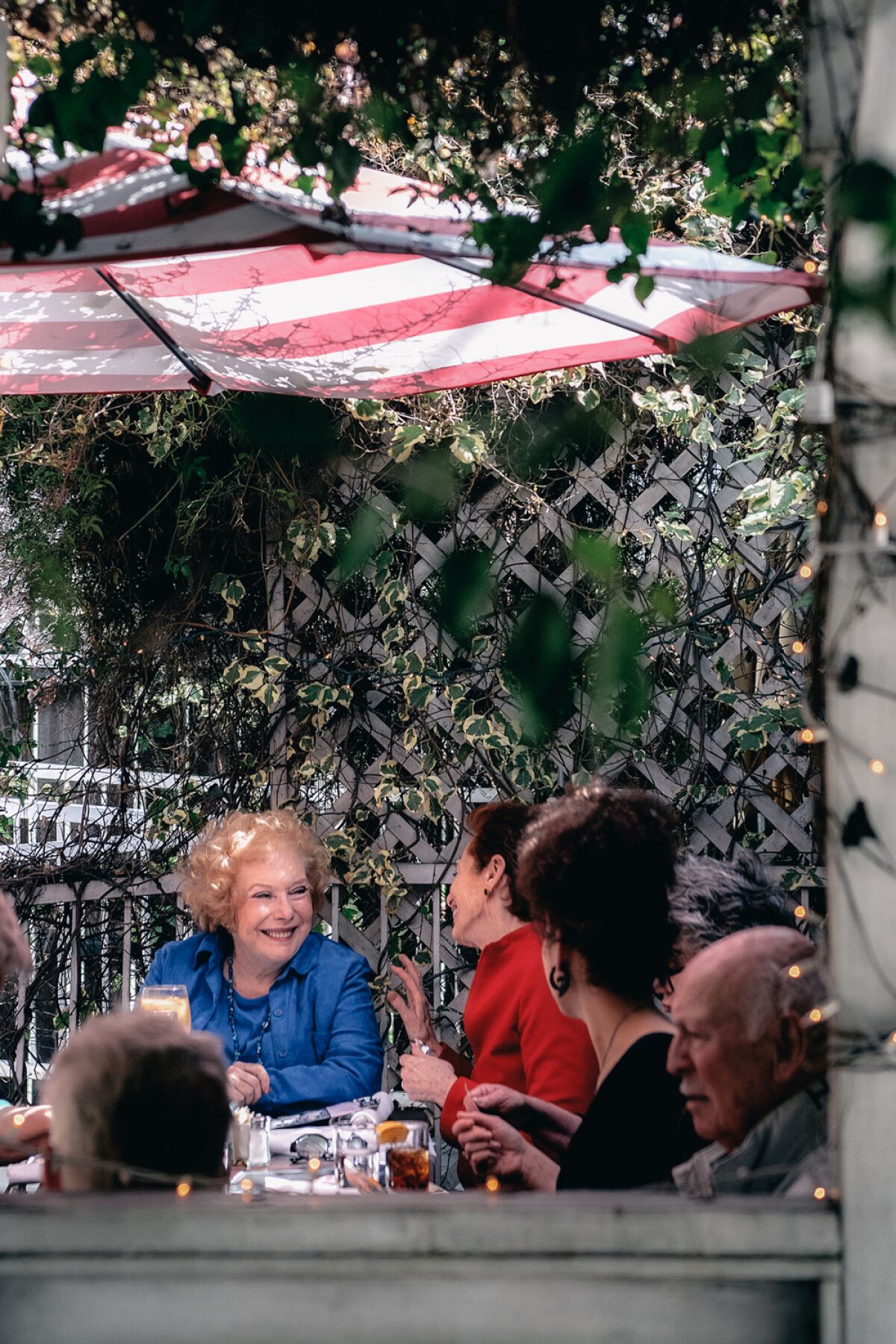
Linda Deutsch, in blue, with fellow members of the Oy Luck Club, at their beloved Hollywood gathering spot Off Vine.
(Mariah Tauger / Los Angeles Times)
This was the last week of life for Off Vine restaurant, a treasured refuge from the hurly burly of Sunset Boulevard, housed in a bungalow with a 115-year history, a repository of countless, colorful movieland stories.
But for me, this was personal. Off Vine had become my own Cheers. Like the theme of the TV show, it was the place “Where everybody knows your name / And they’re always glad you came.”
With my friends and neighbors I found camaraderie and a warm welcome at Off Vine for over 30 years. Like so many other Angelenos, we built memories here and shared delicious meals.
“You’re crying for a restaurant?” she said.
“No,” I said. “I’m crying for all we are losing.”
We also formed a society here called the Oy Luck Club, a tongue-in-cheek title that conveyed this was a place to have a good time. We celebrated birthdays and anniversaries. Some us brought our children as babies and they grew up with this special group of aunts and uncles. They are now adults and still came back to Off Vine as if it were a second home, a family home. It was the glue that bound us together for the rest of our lives.
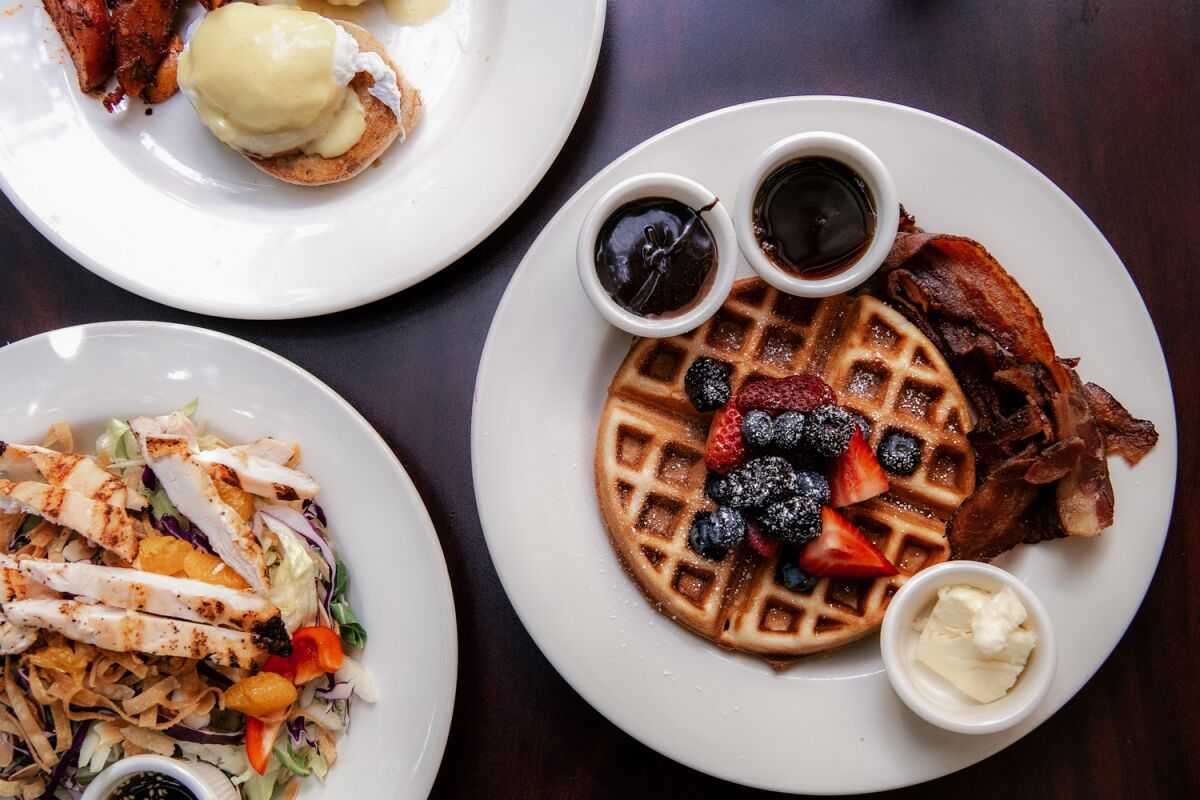
Off Vine brunch dishes, including waffle of the day.
(Mariah Tauger / Los Angeles Times)
How can I tell you why Off Vine matters? If you have been there for a festive brunch on the graceful patio with its bowers of bougainvillea, you may understand. If you took family there for birthday dinners or, like one of my friends, you hosted foreign dignitaries for lunch to show them another side of Hollywood, you will understand.
Recently a friend told me, “You will have to find a new place to go instead of Off Vine.”
I caught my breath, whispered, “I can’t” and began to cry.
“You’re crying for a restaurant?” she said.
“No,” I said. “I’m crying for all we are losing.”
The owners did not plan this. They hoped to stay for a long time. But this is a story of the cost of insensitive development, the devaluation of our city’s history and a place that deserves to be preserved. Otherwise, a treasured piece of Hollywood history will soon be unremembered by anyone.
Hollywood legends
My own story is linked indelibly to the history of Hollywood.
Long ago and far away in a land called New Jersey, I spent many snowy days of childhood dreaming of a magical place called Hollywood where it was always warm and movie stars were everywhere. My dreams were enhanced by movie magazines, which showed a never-ending stream of glamorous actors dining and dancing at night clubs like Ciro’s, Cafe Trocadero, Mocambo and the Earl Carroll Theatre.
Food and drink played a role in the glamour life. Stars had private booths at the likes of Chasen’s and the Brown Derby, where an artist drew caricatures of the famous that hung on the walls. Even a soda fountain, Schwab’s, was famous because legend had it that Lana Turner had been discovered there sitting on a stool sipping a milk shake.
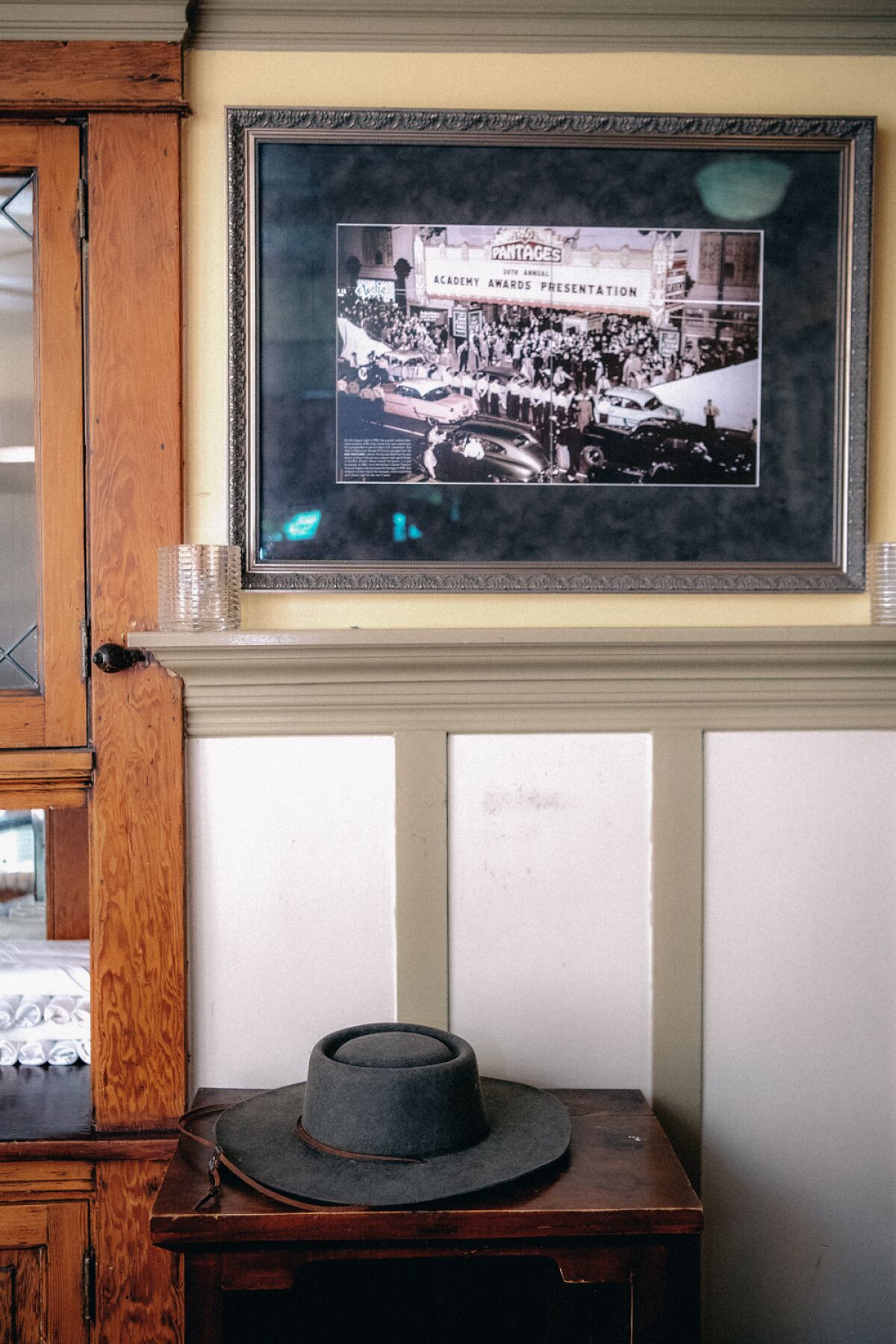
Photos of past Academy Awards and other movie memorabilia are some of the details that made dining at Off Vine a true Hollywood experience.
(Mariah Tauger / Los Angeles Times)
Years later, I would move to Hollywood, but those places were mostly gone, torn down in the march toward modernization. The celebrated history of the movie capital would become confined to the footprints at Grauman’s Chinese Theatre (now TCL Chinese Theatre), stars on the sidewalk and books about its fabled past. As a journalist with the Associated Press, I had the chance to interview stars at the Brown Derby with its big brown hat on the rooftop looming over Hollywood. But soon that too was gone, as was C.C. Brown’s the birthplace of the hot fudge sundae.
So often I’d strike out when I went in search of a Hollywood landmark such as the Garden of Allah residential hotel, where stars such as Errol Flynn and famous writers including F. Scott Fitzgerald and Dorothy Parker lived and partied in their heyday. I found it had been demolished and replaced by a bank (which was itself torn down a couple of years back for a never-built Frank Gehry project).
But all was not lost. One day in 1989 I was driving around Hollywood with my best friend and fellow reporter, Theo Wilson, when she and I discovered a remaining piece of the wonderland I‘d been searching for. It was a small, hidden oasis of a restaurant called Off Vine. Tucked away on a street just south of Sunset Boulevard and east of Vine Street, it was a delightful bungalow with a traditional porch and an outdoor patio. When we stepped inside, the warming fireplace, coffered ceilings and vintage pictures of old-time stars and movie premieres made us feel we had come home. We learned the place had a colorful Hollywood history and just recently had opened as an eating place.
We sat down for a meal of California cuisine coupled with old-fashioned comfort food that pleased our taste buds. We knew this place was a keeper.
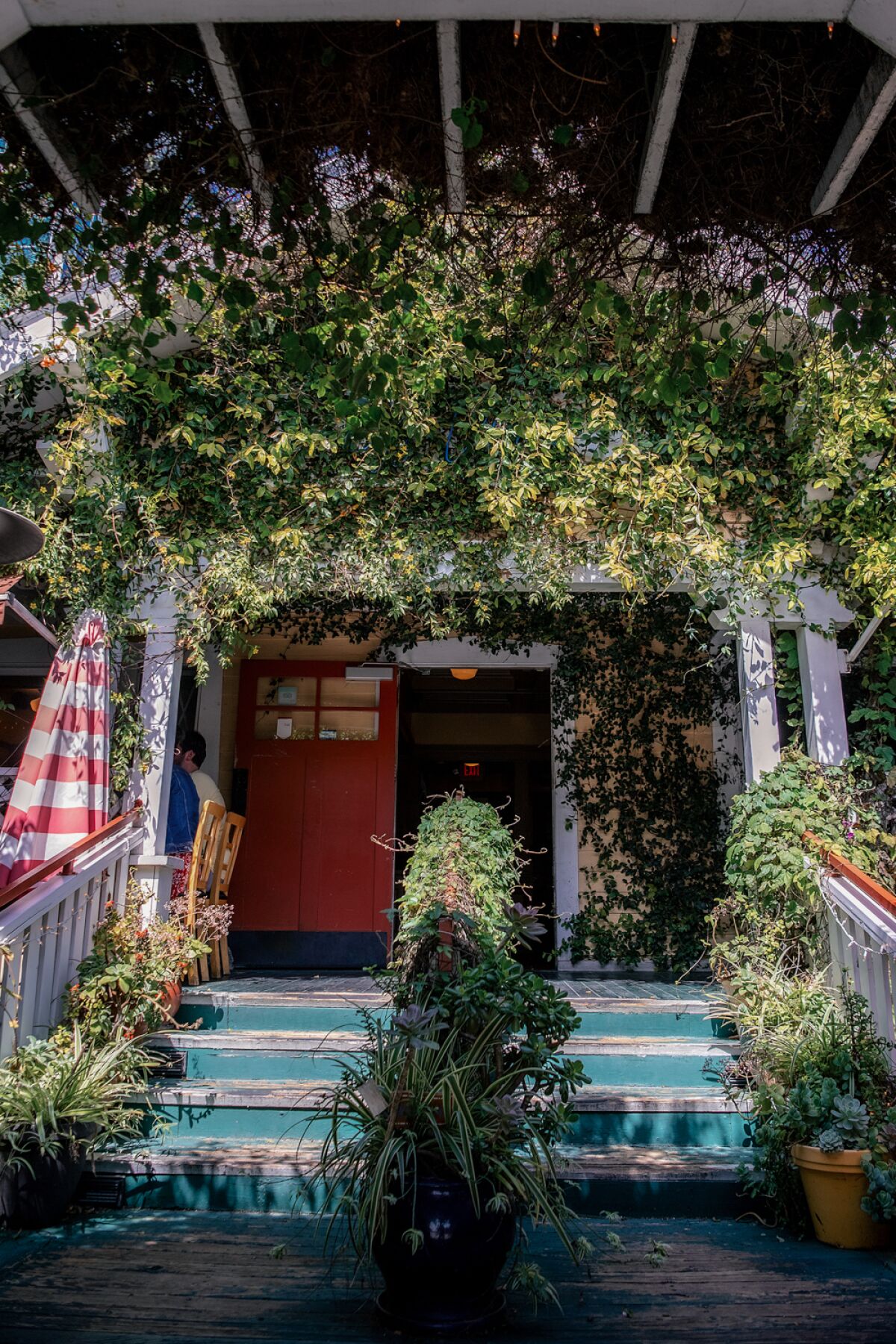
The porch at Off Vine.
(Mariah Tauger / Los Angeles Times)
Over the years it became our go-to destination for brunches, dinners, birthdays and pre-theater meals. We brought neighbors from our Hollywood Heights enclave and founded the Oy Luck Club, a name that reflected the lighthearted intent of the members who were part of a unique community that was not the glitzy movie capital but was Hollywood, a small town with homes and shops, block parties and interesting people.
At one time there were so many of us that we brought our own huge, round tabletop that unfolded to accommodate up to 16 people, our own version of the Algonquin Round Table.
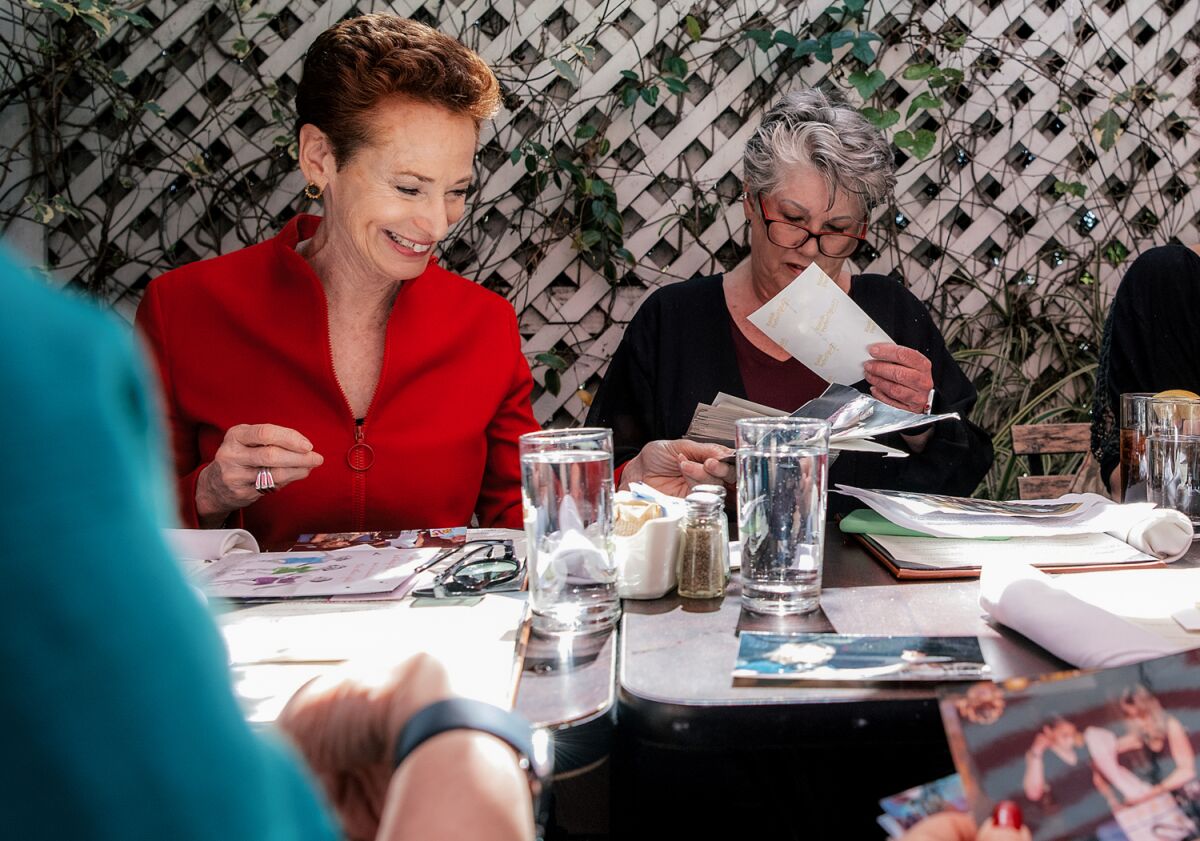
Members of the Oy Luck Club Fran Offenhauser, left, Carol Ward, center, and others gather to celebrate two birthdays at Off Vine on March 18, 2023.
(Mariah Tauger / Los Angeles Times)
Amid this idyllic camaraderie, we never imagined that one day we would lose our treasured piece of history and community. Sadly, that time appears to be now unless some rescuer turns up at the last minute to save it.
The parcel of land on which the restaurant sits has been sold to an investor who plans to tear it down and put up a row of apartments on the whole block. Off Vine sits on what will become an underground parking garage. (Cue the Joni Mitchell song).
A couple of Sundays ago the surviving members of Oy Luck Club gathered at Off Vine to celebrate two birthdays and reminisce about our beloved clubhouse.
One of those being feted was Diva Ward, 31, who had first come to an Oy Luck at Off Vine as an infant in the arms of her mother, Carol, who flew in from Wisconsin for the event. Also celebrating was architect Michael Mekeel, a founding member of Oy Luck. The oldest member present was famed actor Alan Oppenheimer, 92.
We ordered favorites from the brunch menu: a huge Belgian waffle with berries and bacon, eggs Benedict with exquisite hollandaise sauce, omelets, a breakfast quesadilla and salads. The grand finale was, as always, the signature Off Vine soufflé available in chocolate, raspberry or Grand Marnier. It had to be ordered half an hour ahead but was worth the wait. Nowhere else have I ever tasted such a rich, puffy soufflé.
Movie-worthy history
We shared memories with co-owner Richard Falzone who has saved Off Vine repeatedly. Everyone listened as I recounted the colorful story of the little house, which itself could be the inspiration for a movie.

Off Vine co-owner Richard Falzone.
(Mariah Tauger / Los Angeles Times)
The classic Craftsman bungalow was built in 1908 on a dirt road surrounded by fruit trees and orange groves off a newly formed country path called Vine Street.
With the burgeoning film industry in its infancy, houses began popping up to accommodate the actors, crews and producers who came west to get in on the new art form.
The house at 6263 Leland Way off Vine Street eventually was purchased by theater and night club impresario Earl Carroll for the actress and showgirl Beryl Wallace.
Carroll discovered Wallace in New York and put her on stage in his famous and somewhat scandalous “Vanities,” which featured elaborate productions with beautiful, scantily clad showgirls. She was his star. The two fell in love and for the next two decades she would be his girlfriend and constant companion. When he left Broadway under a cloud due to increasingly risqué shows, he decided to go west to seek a new venue for his extravagant dreams. He brought Wallace with him to Hollywood, where she had small roles in 23 films and performed at the Earl Carroll Theatre, a supper club and entertainment venue on Sunset Boulevard. The building’s exterior bore a 24-foot neon likeness of Wallace with the slogan, “Through these portals pass the most beautiful girls in the world.”
The club, which was colossal in size and from 1997 to 2017 housed Nickelodeon’s TV production studios, is set for renovation and has been declared a historic monument. Built by Carroll in 1938, it housed a 1,000-seat showroom where productions featured 60 showgirls performing on a double revolving stage. Members of Hollywood royalty were among those who paid $1,000 each for VIP lifetime memberships.
Wallace was its premier star, and Carroll felt she needed a residence that would also serve as a retreat between shows. He purchased the charming bungalow on Leland Way that became Wallace’s home. Later her mother lived with her there while the town of Hollywood grew around them. The Pantages Theatre is a few blocks away and the Cinerama Dome is around the corner. Schwab’s was up the street at Hollywood and Vine.
But not all Hollywood stories have happy endings. Tragedy struck in 1948 when Wallace and Carroll, en route to New York to discuss aneven bigger project, died together in a plane crash in Pennsylvania. A year later, her mother, suffering from depression over the loss of her daughter, committed suicide.
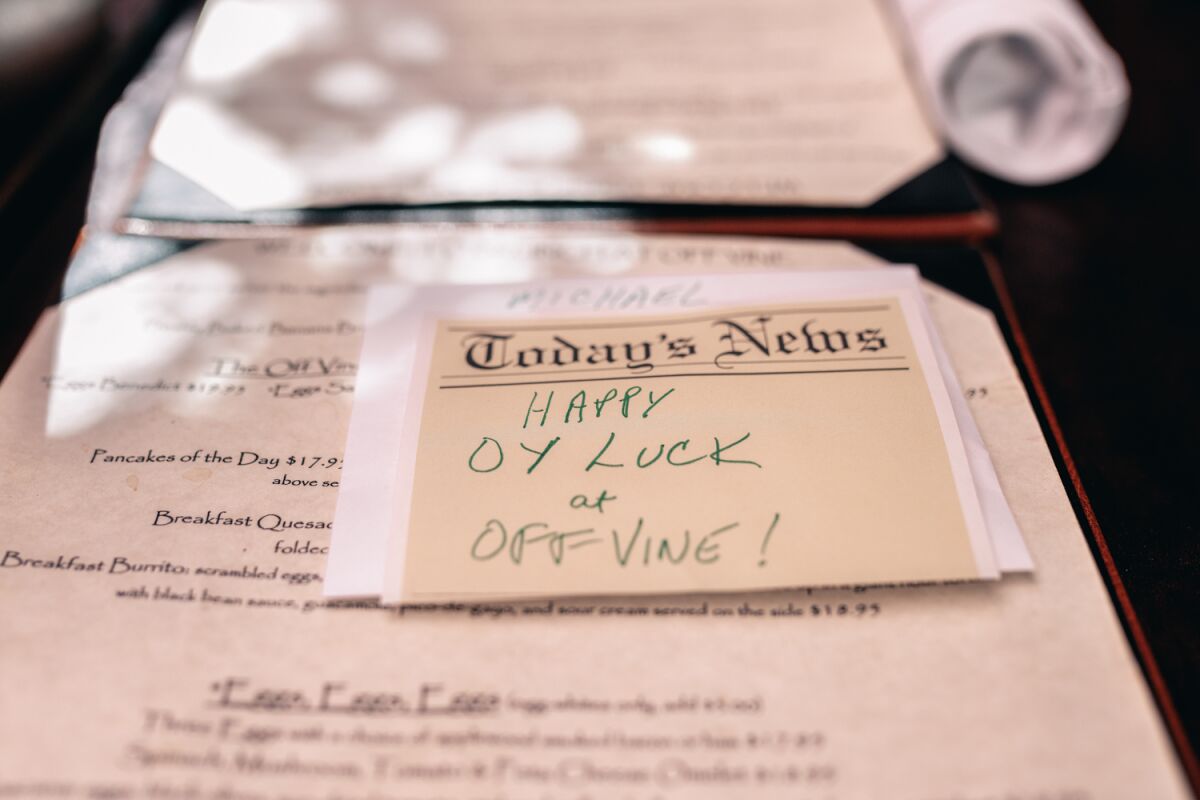
Placards for the members of the Oy Luck Club at what is likely to be the group’s last gathering at their beloved restaurant, Off Vine.
(Mariah Tauger / Los Angeles Times)
The little bungalow was home to Beryl’s sister for a time and then was rented to several short-term tenants, including a music production company and a shoe repair shop.
In 1989 it emerged from hiding and became the unexpected restaurant known as Off Vine, which offered an escape from the chaos and glitz that is current-day Hollywood. One historian of the area said of the spot: “It has survived through the Roaring Twenties, the Great Depression, Hollywood’s Silent and Golden eras, numerous earthquakes, ambitious landowners and, in 2007 a disastrous fire.” But even the electrical fire that gutted the upper story and forced closure of the restaurant for two years while repairs were done could not kill Off Vine. Its savior since 1997 has been Falzone, a former Broadway theater performer who came West in search of his movieland dreams.
He found an unexpected career change when he took a temporary job as a server at Off Vine. He loved the place, worked his way up to general manager and became a part owner with two partners. Eight months later the fire sparked in antiquated wiring panels devastated the house.
But Falzone persisted. He set up an office on the front porch to handle calls from loyal customers and to deal with the city and insurance companies. Two years later, the Craftsman bungalow, looking the same as ever, reopened. It took $750,000 to save it.
The owners were required to bring the house up to code and added a sprinkler system, larger restrooms, a wheelchair ramp and a new state-of-the-art kitchen. The upper floor, used for parties, was restored with its 13-foot coffered ceiling.
“Our journey has been long and tumultuous, full of struggles and setbacks,” Falzone said at the reopening ceremony. “It also has come to exemplify the strength of a community that has continually offered guidance, encouragement and support to a small business that found itself struggling to reopen its doors during one of the worst economic crises our country has ever seen.”
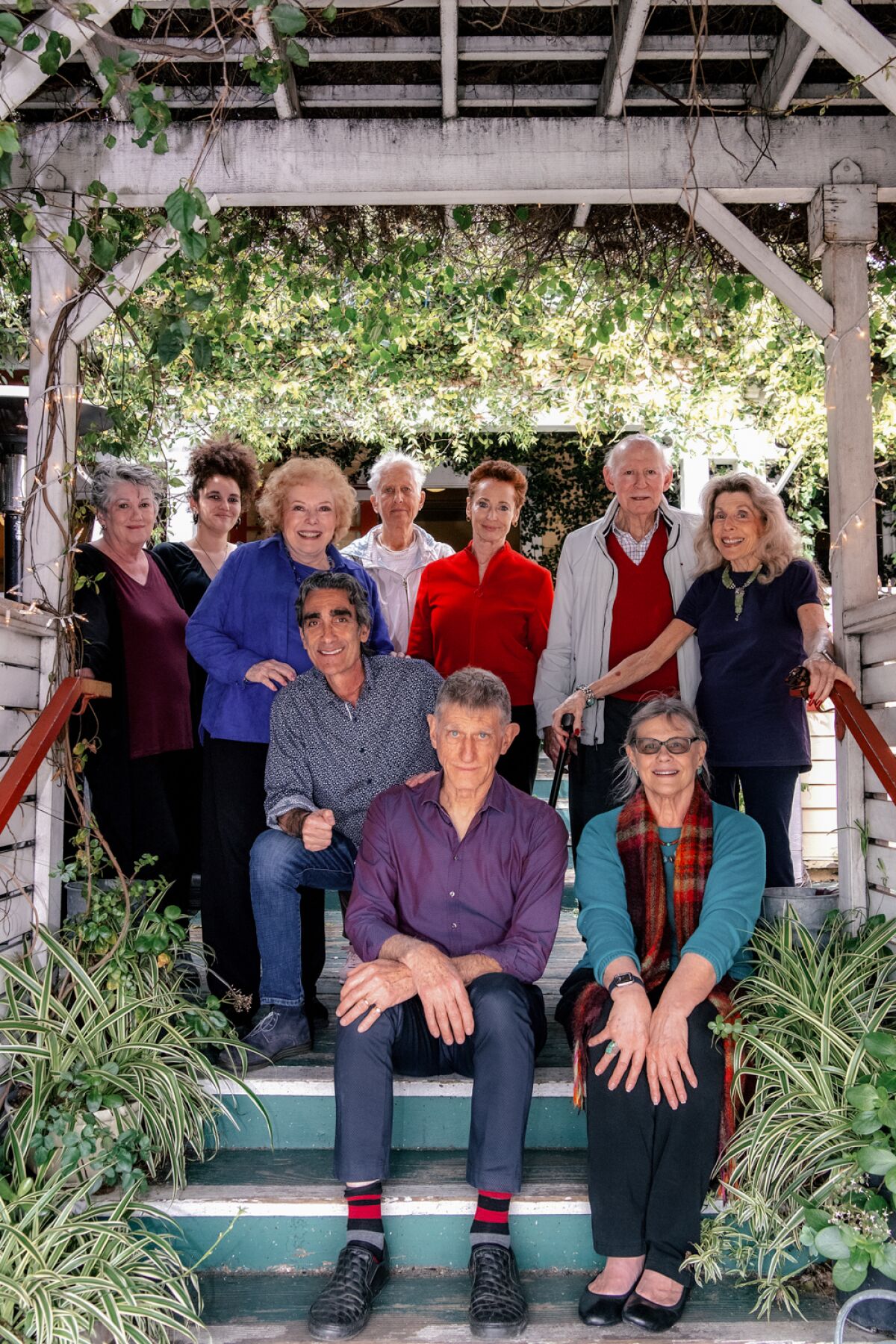
Members of the Oy Luck Club at Off Vine a week before its closing: top row from left, Carol Ward, Diva Ward, Linda Deutsch, Helga Mattke, Fran Offenhauser, Alan Oppenheimer and Fredrica Cooper; second row from left, Richard Falzone, Michael Mekeel and Noel Vernon.
(Mariah Tauger / Los Angeles Times)
Then L.A. City Council president and future mayor Eric Garcetti said, “This Hollywood gem adds to the continued revitalization of our community.” Loyal customers, including the Oy Luck Club gang, returned in droves. The rebirth of the Pantages Theatre as a venue for Broadway road shows brought audience members there for pre-theater meals.
Things were going so well that Falzone decided it might be time to apply for designation as a Hollywood historic landmark. He was supported by Hollywood Heritage, a preservation group whose co-founder, architect Fran Offenhauser, has spearheaded campaigns to save historic buildings from the wrecking ball.
But the arbiters of such decisions looked at its history and ruled that because of the fire, which resulted in a few visible exterior changes, Off Vine did not qualify.
Then the pandemic hit and Falzone had to close. But again the little restaurant that could, with the help of government COVID subsidies, survived. Off Vine reopened as soon as it was safe and struggled to get enough servers. Some loyal employees returned. Amid all of that, Falzone was blindsided by the sale and was given notice that when the lease expires this April he would be required to vacate the property.
It turns out that Earl Carroll, in a seeming premonition and an act of love for his inamorata, added a codicil to his will stating that if he and Wallace should die together the property would go to her heirs. It was still owned by Wallace’s descendants 75 years later when they yielded to a multimillion-dollar offer from Invesco, a Chicago development firm that was interested not in the lovely little house but the land on which it stands.
Notice was also given to other nearby restaurants. A Chipotle has already relocated.
“This has been my life for 26 years. It’s been my heart, my soul, my baby and my family. It’s been my everything,’’ Falzone told me. “It’s not just a restaurant. People are coming into a family home and they are our family. It’s a home where there’s love, good food and good cheer.”
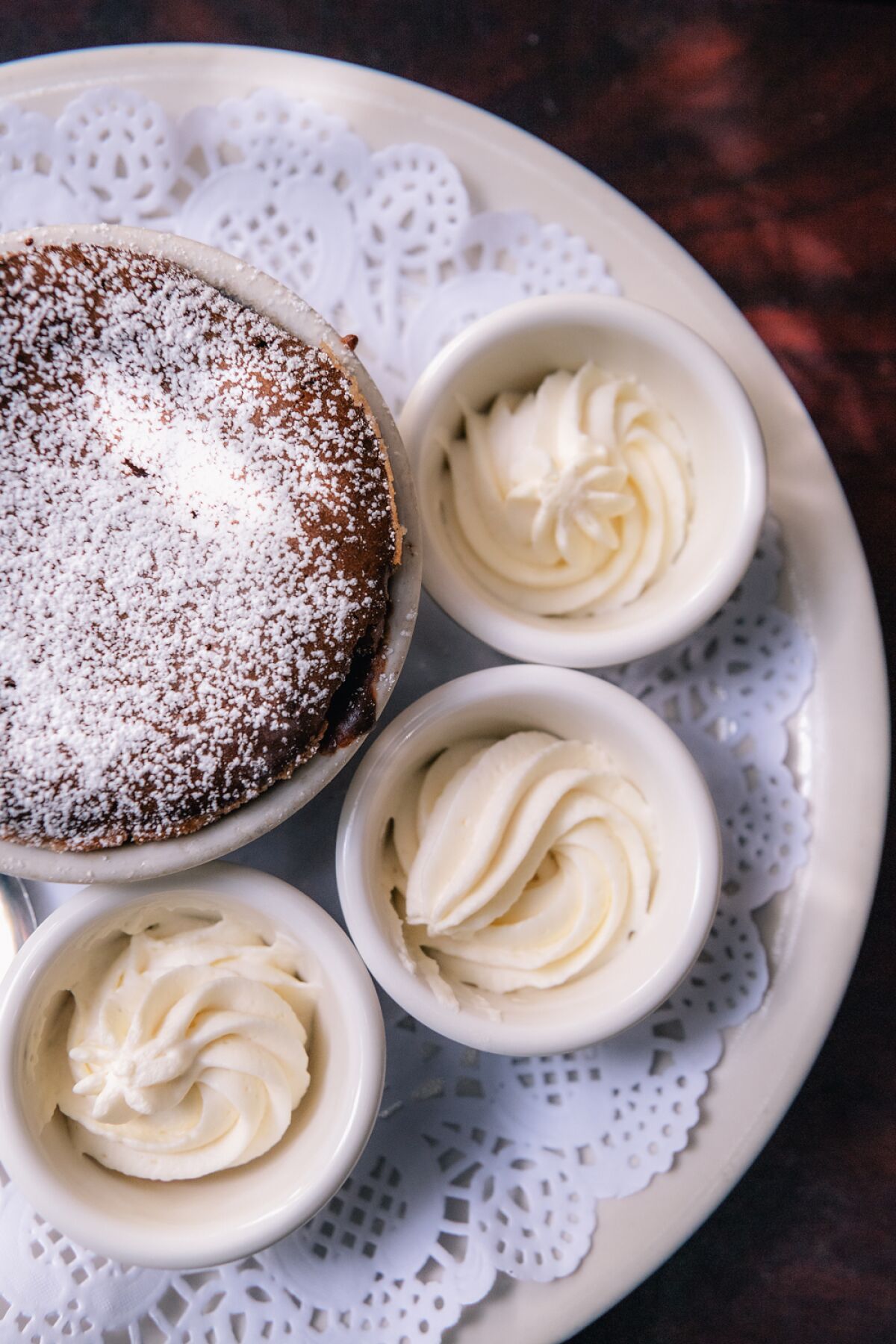
Chocolate souffle at Off Vine.
(Mariah Tauger / Los Angeles Times)
Offenhauser, who also is a founding member of the Oy Luck Club and a powerful advocate for Hollywood preservation, sees this as another nail in the coffin of Hollywood’s history.
“There is a real Hollywood and it’s getting smothered,” she told me as we commiserated about the impending loss. “It is not a sign of progress to destroy things that are meaningful. It’s important to integrate them with whatever is new that is compatible and complementary.”
“It’s not rocket science to be able to save Off Vine,” she said. “If you recognize something is important you can build around it. It’s possible to build new and not destroy the old. In the alternative, the building could be moved to another lot. It’s not that complicated.”
We reflected on how many of us who are transplants to Hollywood made it our real home town.
“For whatever reason we came to Hollywood we bonded with it deeply.” Offenhauser said. “This bungalow reflects that. It means something much bigger than our individual personal memories. It manifests what neighbors mean; what Beryl’s life meant; how Richard knit people together with his unique grasp of food in a home; what a livable humanistic neighborhood in Hollywood — with neighbors walking by that porch — did mean and should mean. “
When I asked Falzone the other day what happened to the pictures and memorabilia of the beautiful Beryl Wallace that adorned the walls of Off Vine as long as I had been going there, he said the family came and collected everything. Sadly, there remains no evidence that the glamorous star ever lived there.
—-
Deutsch, longtime special correspondent for the Associated Press, is known for covering the trials of O.J. Simpson, Angela Davis, Phil Spector, Patty Hearst, Charles Manson, Robert Blake, Lyle and Erik Menendez, Michael Jackson and many more. She has been a resident of Hollywood for more than 50 years, first in the Hollywood Heights and currently the Hollywood Dell.
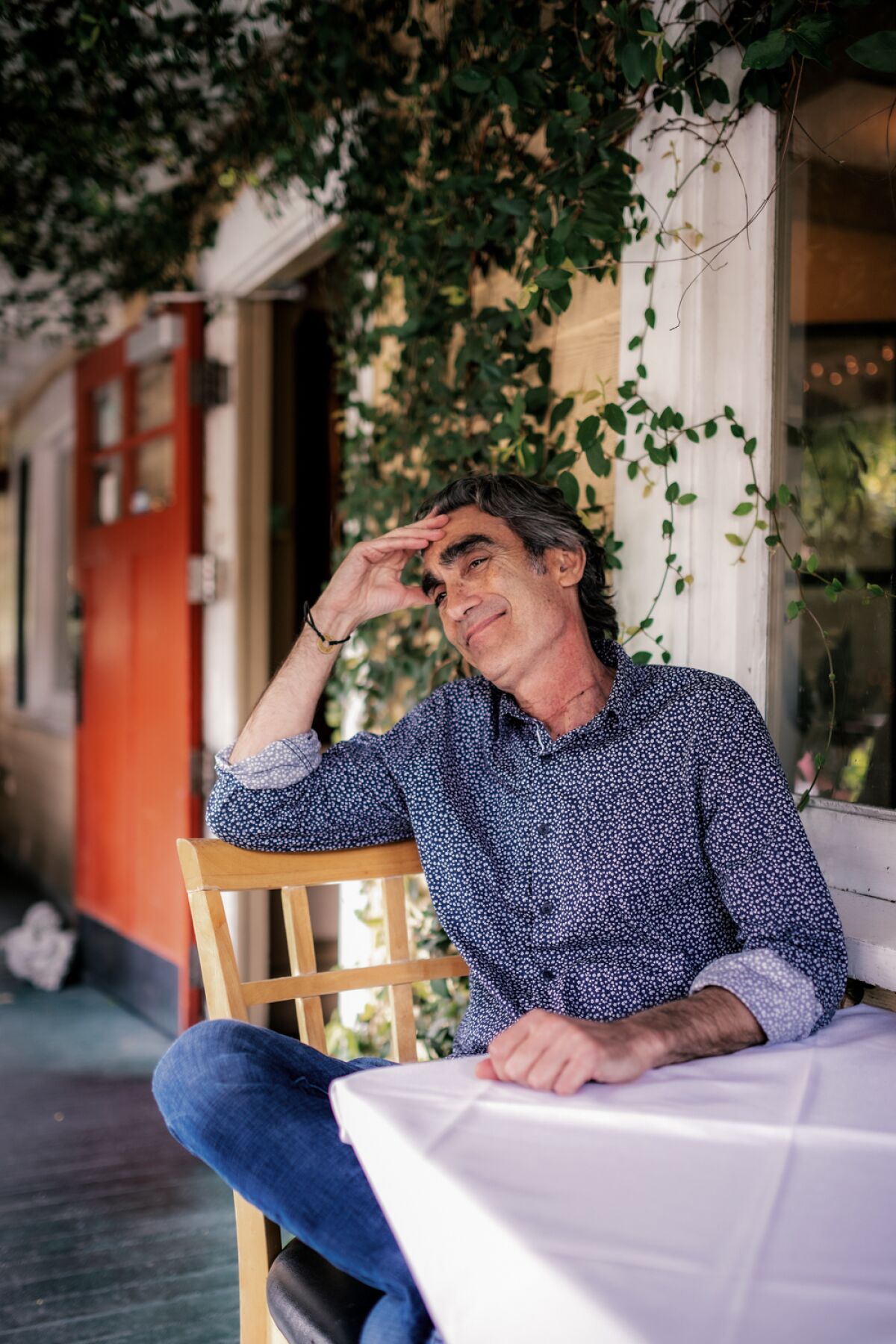
Off Vine co-owner Richard Falzone.
(Mariah Tauger / Los Angeles Times)
Stay connected with us on social media platform for instant update click here to join our Twitter, & Facebook
We are now on Telegram. Click here to join our channel (@TechiUpdate) and stay updated with the latest Technology headlines.
For all the latest Art-Culture News Click Here
